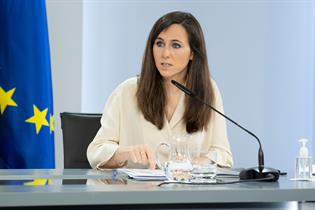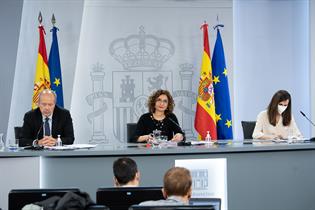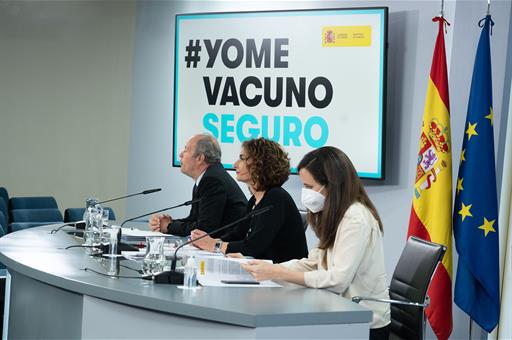Council of Ministers
Government to allocate 730 million euros to care for elderly and dependents, social services and accessibility
Council of Ministers - 2021.4.20
Moncloa Palace, Madrid
The Council of Ministers agreed to distribute 730.8 million euros in European funding to the regional governments and autonomous cities from European funding allocated to the care economy. The specific amounts for each of them will be agreed at the Territorial Council for Social Services and the System for Autonomy and Dependency Care.
The Minister for Social Rights and 2030 Agenda, Ione Belarra, explained that the funds are for specific purposes and hence will be allocated to actions framed within three concrete plans.
The Plan for long-term support and care, with an allocation of 482 million euros, which seeks to attend, as a priority, to the elderly and dependent persons who live at home, and, when this is not possible, provide this care at smaller care homes with more stable personnel. According to Ione Belarra, the current care home model "is neither adequately catering for the needs of the elderly and dependent persons nor for their wishes", since most prefer to be cared for at home, insofar as that is possible.
 Foto: Pool Moncloa/Borja Puig de la BellacasaThe Plan to modernise social services, which will be allocated 216 million euros, seeks to make these services more accessible and effective for citizens, and also provides for a reform of the system to protect children.
Foto: Pool Moncloa/Borja Puig de la BellacasaThe Plan to modernise social services, which will be allocated 216 million euros, seeks to make these services more accessible and effective for citizens, and also provides for a reform of the system to protect children.
The Accessible Spain Plan will allocate the remaining 31 million euros to resolve physical and cognitive accessibility problems for people with functional diversity, such as those affected by a disorder on the autism spectrum, and to improve accessibility to public transport.
The minister reflected on the importance of activating the care economy in our country to add "the social transition" to the necessary ecological and digital transitions that will be pushed through with the reception of the European funds.
Ione Belarra indicated that these investments are positive because, as well as tangibly improving people's lives, they create jobs not at risk of relocation, help settle people in rural environments and contribute to improving the conditions of a female dominated sector that is traditionally insecure, such as domestic workers and the care system for dependency.
Extension of beneficiary sectors of direct aid
 Foto: Pool Moncloa/Borja Puig de la BellacasaThe Council of Ministers amended the Royal Decree on extraordinary measures to support business solvency in response to the COVID-19 pandemic approved on 12 March.
Foto: Pool Moncloa/Borja Puig de la BellacasaThe Council of Ministers amended the Royal Decree on extraordinary measures to support business solvency in response to the COVID-19 pandemic approved on 12 March.
The Minister for the Treasury and Government Spokesperson, María Jesús Montero, explained that the aim of this measure is for the regional governments and autonomous cities of Ceuta and Melilla to extend the sectors and companies that may benefit from the line of direct aid to the self-employed and companies, with an allocation of 7 billion euros. The new law also includes the possibility of granting, on an exceptional basis, support for viable companies that posted a loss in 2019.
María Jesús Montero stated that the government identified almost 100 sectors based on objective criteria at a national level, but is aware that each autonomous region has specific characteristics that require tailored responses.
The Government Spokesperson highlighted the government's work to ensure that support reached beneficiaries as soon as possible, to which end it approved an order last week to distribute the resources and sent the regional governments the agreements they need to sign to transfer the funds within a maximum period of 10 days from the date of signature.
The Autonomous Regions of Extremadura and Castile-La Mancha, announced the Government Spokesperson, have already returned the agreement signed, and once published in the Official State Gazette, will receive the funds immediately.
Furthermore, in order to facilitate for companies the payment of their non-tax obligations, the finance and treasury delegation may grant a two-year grace period from their date of maturity and subsequent division of the debt into instalments for up to two years.
"If we add up the postponements and divisions into payment instalments, companies will have up to four years to pay their debts", concluded María Jesús Montero, who added that "applications may be presented in the financial years 2021 and 2022, regardless of the period they relates to ".
Organisational efficiency of public system of justice
 Foto: Pool Moncloa/Borja Puig de la BellacasaThe Council of Ministers approved the draft bill on the Organisational Efficiency of the Public System of Justice Act, which comes on top of the law on procedural efficiency pushed through back in December, and which will be completed with a third law, foreseeably before the summer, on digital efficiency.
Foto: Pool Moncloa/Borja Puig de la BellacasaThe Council of Ministers approved the draft bill on the Organisational Efficiency of the Public System of Justice Act, which comes on top of the law on procedural efficiency pushed through back in December, and which will be completed with a third law, foreseeably before the summer, on digital efficiency.
The Minister for Justice, Juan Carlos Campo, underlined that "the interest, emphasis and energy" of the government seek to achieve the efficiency of the system of justice, essential for our citizens, along with its modernisation, such that justice policies also contribute to the recovery and transformation of the country. In order to fully focus on this goal, Juan Carlos Campo announced the government's intention to ask those parliamentary groups that have registered an initiative to change the composition of the General Council of the Judiciary (Spanish acronym: CGPJ) to withdraw them.
Juan Carlos Campo claimed that guaranteeing the constitutional right to the effectiveness of the judicial system will make its possible to reverse the current negative perception people have. According to different figures, rulings have dropped by around 6% and the duration of proceedings have risen from 66 to 162 days, despite Spain being one of the countries that has invested the most (70.1 euros per inhabitant compared with the European average of 64 euros), heading up the index on technological equipment, and that the judicial workforce has increased by 50% over the last 20 years while litigation has dropped by 35% in the last 10 years.
Three main pillars of the reform
The pillars of the new structure of the administration of justice will be the Courts of First Instance, the Judicial Office and the municipal Justice Offices.
The Courts of First Instance - one in each judicial district - will lead to greater "accessibility, efficiency and flexibility in organisational aspects". The governing bodies of these courts will be elected by the judges on a participatory basis.
Each court will have specialised sections, and their presidents will be able to set unification criteria. The judges that do not follow or adopt these must justify their reasons for not doing so. "I feel that in this way we will provide the system with greater foreseeability, and thus legal certainty", indicated the minister.
The Judicial Offices, which have existed since 2003, will be boosted so that they are present throughout the country, and the municipal Justice Offices will be an extension of the current community peace courts to attend to citizens in a closer and more cross-cutting fashion.
Juan Carlos Campo stressed that the aim is for them to become a benchmark for citizens in towns and villages, not just in relation to judicial proceedings but also in regard to other administrative procedures that could be offered through agreements with other public bodies and authorities.
The minister expressed his gratitude for the work and participation in the draft bill of the regional governments, the General Council of the Judiciary, the Public Prosecutor's Office, professionals - lawyers and court attorneys, social graduates - trade unions and political parties, in what has been an example, he said, of co-governance.
Pandemic and vaccination rate
The Council of Ministers analysed the situation of the pandemic and the vaccination rate. The Government Spokesperson reported that Spain has acquired more than 93 million doses of vaccine, of which it has received 14 million. This has meant that 20% of the population - one in five people - have been administered the first dose and 3.4 million the full dose.
María Jesús Montero announced that since Monday and throughout the month of May, an average of 1.7 million doses will be received each week from the brand Pfizer-BioNTech, in addition to those received from other commercial brands.
The decision by the European Union to activate the purchase of 100 million additional doses from Pfizer-BioNTech, highlighted María Jesús Montero, means that Spain will have sufficient margin to achieve its target of vaccinating 70% of the population in the month of August.
Limitations on flights from Brazil and South Africa
The government extended the limitations on arrival in Spain by air from Brazil and South Africa. This is the sixth extension of the agreement with restrictions on flights from these countries to Spanish airports, with the aim of halting the spread and contagion of COVID-19.
María Jesús Montero specified that the measures will come into force at midnight on 27 April (mainland time) and remain in force until midnight on 11 May 2021 (mainland time).
More than 387 million euros for post-doctoral support
The government approved the granting of direct subsidies, on a multiannual basis, to public universities for retraining in the university system.
María Jesús Montero claimed that this is the most ambitious investment in post-doctoral subsidies in this area to date: 361.56 million euros over the period 2021-2023, in addition to the 25.59 million euros that will be directly transferred to the National Distance Education University (Spanish acronym: UNED). The aim is to boost retraining and the national and international mobility of teaching and research staff, which will help raise the quality of the public university service.
The Government Spokesperson specified that a minimum of 2,521 subsidies will be granted in three modalities: Margarita Salas subsidies to train young doctors; subsidies to retrain teaching and research staff, whether tenured or on contract with 10 years or less in their current category; and María Zambrano subsidies to attract international talent. The three modalities require national or international mobility at universities or research centres for those who presented their doctoral thesis.
María Jesús Montero added that the government expects to have granted all the subsidies, that will be directly managed by public universities, by 1 December 2021.
Other agreements
 Foto: Pool Moncloa/Borja Puig de la BellacasaIn terms of education, the Council of Ministers created three specialised vocational training courses: one on Artificial Intelligence and Big Data, another on Additive Manufacturing and a third on the Maintenance of Hybrid and Electric Vehicles.
Foto: Pool Moncloa/Borja Puig de la BellacasaIn terms of education, the Council of Ministers created three specialised vocational training courses: one on Artificial Intelligence and Big Data, another on Additive Manufacturing and a third on the Maintenance of Hybrid and Electric Vehicles.
The Government Spokesperson explained that the courses will complete the professional profiles of those who are already on a vocational training course that need to learn about the latest innovations in their respective fields. She added that the government thus continues to renew and extend its training offer within the framework of the Plan to Modernise Vocational Training.
The Council of Ministers approved measures to support the wine sector, adapting Spanish legislation to the new scenario of flexibility approved under EU legislation due to the pandemic.
María Jesús Montero specified that the changes will exempt wine-makers and cellars from certain penalties, make deadlines required in the sector more flexible and increase the participation of the European Union in subsidies.
On the occasion of World Intellectual Property Day, held on 26 April, the government approved an institutional statement expressing its commitment to the defence of intellectual and industrial property rights.
The Government Spokesperson specified that companies that make use of these rights account for 40% of the Gross Domestic Product and for 27% of jobs. These companies, she continued, "are essential for the transformation of the Spanish economic model and to help move towards a more sustainable and integrating model".
Current affairs
During her appearance at the press briefing following the Council of Ministers, María Jesús Montero referred to the participation of the President of the Government, Pedro Sánchez, at the 27th Ibero-American Summit of Heads of State and Government, being held in Andorra. At this forum, the President of the Government will announce that Spain will make vaccines available to Latin America - one of the zones worst affected by the virus, to tackle the health emergency.
María Jesús Montero recalled that access to the vaccines must be equitable and universal and that the government approved a solidarity plan for vaccines at the start of the year.
The Government Spokesperson argued that Spain intends to "coordinate this action with the European Union so that the doses can reach the countries that need them as a priority as soon as possible".
The minister also announced that the President of the United States, Joe Biden, has invited Pedro Sánchez to take part in the Climate Summit that will meet in a virtual format on 22 and 23 April.
The holding of this summit, according to María Jesús Montero, shows that the new United States Administration is once again committing to the ecological transition. Spain, she added, is one of the countries most committed to the fight against climate change, proof of which is that 39% of the funds under the Recovery, Transformation and Resilience Plan will be invested in areas related to this transition.
Non official translation





